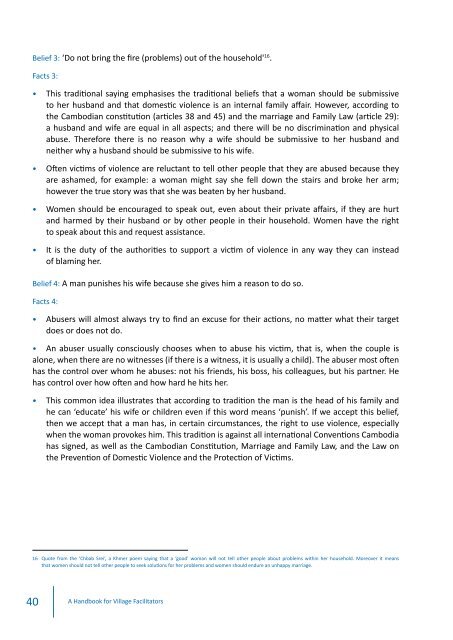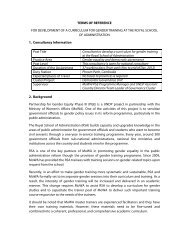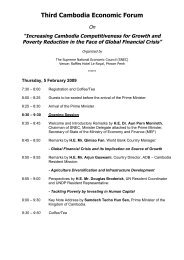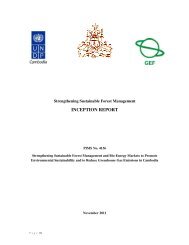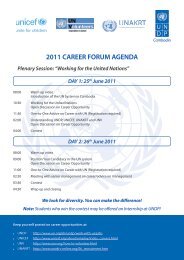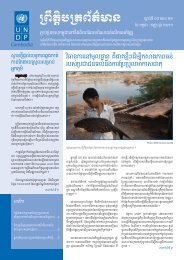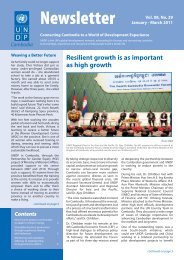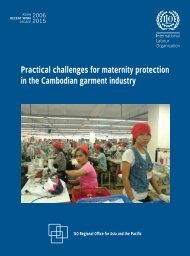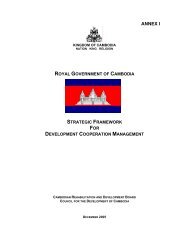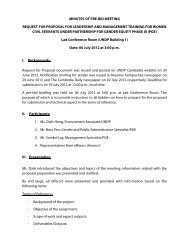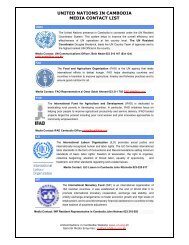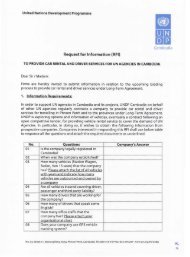Talking about domestic violence: A handbook for ... - Engagingmen.net
Talking about domestic violence: A handbook for ... - Engagingmen.net
Talking about domestic violence: A handbook for ... - Engagingmen.net
Create successful ePaper yourself
Turn your PDF publications into a flip-book with our unique Google optimized e-Paper software.
Belief 3: ‘Do not bring the fire (problems) out of the household' 16 .<br />
Facts 3:<br />
• This traditional saying emphasises the traditional beliefs that a woman should be submissive<br />
to her husband and that <strong>domestic</strong> <strong>violence</strong> is an internal family affair. However, according to<br />
the Cambodian constitution (articles 38 and 45) and the marriage and Family Law (article 29):<br />
a husband and wife are equal in all aspects; and there will be no discrimination and physical<br />
abuse. There<strong>for</strong>e there is no reason why a wife should be submissive to her husband and<br />
neither why a husband should be submissive to his wife.<br />
• Often victims of <strong>violence</strong> are reluctant to tell other people that they are abused because they<br />
are ashamed, <strong>for</strong> example: a woman might say she fell down the stairs and broke her arm;<br />
however the true story was that she was beaten by her husband.<br />
• Women should be encouraged to speak out, even <strong>about</strong> their private affairs, if they are hurt<br />
and harmed by their husband or by other people in their household. Women have the right<br />
to speak <strong>about</strong> this and request assistance.<br />
• It is the duty of the authorities to support a victim of <strong>violence</strong> in any way they can instead<br />
of blaming her.<br />
Belief 4: A man punishes his wife because she gives him a reason to do so.<br />
Facts 4:<br />
• Abusers will almost always try to find an excuse <strong>for</strong> their actions, no matter what their target<br />
does or does not do.<br />
• An abuser usually consciously chooses when to abuse his victim, that is, when the couple is<br />
alone, when there are no witnesses (if there is a witness, it is usually a child). The abuser most often<br />
has the control over whom he abuses: not his friends, his boss, his colleagues, but his partner. He<br />
has control over how often and how hard he hits her.<br />
• This common idea illustrates that according to tradition the man is the head of his family and<br />
he can ‘educate’ his wife or children even if this word means ‘punish’. If we accept this belief,<br />
then we accept that a man has, in certain circumstances, the right to use <strong>violence</strong>, especially<br />
when the woman provokes him. This tradition is against all international Conventions Cambodia<br />
has signed, as well as the Cambodian Constitution, Marriage and Family Law, and the Law on<br />
the Prevention of Domestic Violence and the Protection of Victims.<br />
16 Quote from the ‘Chbab Srei’, a Khmer poem saying that a ‘good’ woman will not tell other people <strong>about</strong> problems within her household. Moreover it means<br />
that women should not tell other people to seek solutions <strong>for</strong> her problems and women should endure an unhappy marriage.<br />
40 A Handbook <strong>for</strong> Village Facilitators


